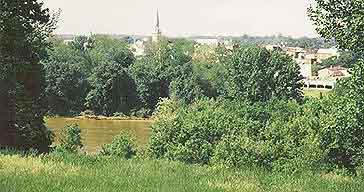A
Bivouac with the Dead by Joshua Lawrence Chamberlain It
was a cold night. Bitter, raw north winds swept the stark
slopes. The men, heated by their energetic and exciting
work, felt keenly the chilling change. Many of them had
neither overcoat nor blanket, having left them with the
discarded knapsacks. They roamed about to find some
garment not needed by the dead. Mounted officers all
lacked outer covering. This had gone back with the
horses, strapped to the saddles. So we joined the uncanny
quest. Necessity compels strange uses. For myself it
seemed best to bestow my body between two dead men among
the many left there by earlier assaults, and to draw
another crosswise for a pillow out of the trampled,
blood-soaked sod, pulling the flap of his coat over my
face to fend off the chilling winds, and, still more
chilling, the deep, many-voiced moan that overspread the
field. It was heart-rending; it could not be borne. I
rose at midnight from my unearthly bivouac, and taking
our adjutant for companion went forth to see what we
could do for these forsaken sufferers. The deep sound led
us to our right and rear, where the fiercest of the fight
had held brave spirits too long. As we advanced over that
stricken field, the grave, conglomerate monotone resolved
itself into its diverse, several elements: some breathing
inarticulate agony; some dear home names; some begging
for a drop of water; some for a caring word; some praying
God for strength to bear; some for life; some for quick
death. We did what we could, but how little it was on a
field so boundless for feeble human reach! Our best was
but to search the canteens of the dead for a draft of
water for the dying; or to ease the posture of a broken
limb; or to compress a severed artery of fast-ebbing life
that might perhaps be so saved, with what little skill we
had been taught by our surgeons early in learning the
tactics of saving as well as of destroying men. It was a
place and time for farewells. Many a word was taken for
faraway homes that otherwise might never have had one
token from the field of the lost. It was something even
to let the passing spirit know that its worth was not
forgotten here.
Index to Chamberlain's Pages
Copyright © 2001 - 2009 1st Dragoon's Civil War Site. All rights reserved. |
||||||

